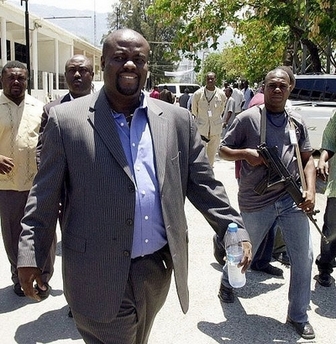| @wehaitians.com | |
No one writes to the tyrants | |
HistoryHeads/Not Just Fade Away |
| Correspond with us, including our executive editor, professor Yves A. Isidor, via electronic mail: |
| letters@wehaitians.com; by way of a telephone: 617-852-7672. |
| Want to send this page or a link to a friend? Click on mail at the top of this window. |
|
 |
|
| Posted Monday, April 14, 2008 |
| A better quality of life, but not even a dream since aid workers fear widening hunger will soon become the norm in Haiti |
| By Jonathan M. Katz, Associated Press Writer |
PORT-AU-PRINCE, Haiti - Aid organizations said Sunday they feared the nutritional crisis could deepen in impoverished Haiti, where skyrocketing food prices have already led to deadly protests and the ouster of the nation's No. 2 politician.
 |
| Haitian Senator Rudy Herivaux leaves paliament in Port-au-Prince after voting to censure the Prime Minister. Haiti's prime minister was ousted Saturday in a no confidence vote after more than a week of violent demonstrations over rocketing food and fuel prices.(AFP/Thony Belizaire) |
With anger over food prices threatening the stability of this Caribbean nation already haunted by chronic hunger, the U.N. World Food Program appealed for donations to meet its US$96 million (euro61 million) aid goal for Haiti.
The president of the World Bank on Sunday announced an additional US$10 million (euro6.3 million) in aid to Haiti for feeding programs. Robert Zoellick said the ouster of Haiti's prime minister after a wave of rioting and looting over food prices underscores the importance of quick international action.
The chief of the International Monetary Fund, Dominique Strauss-Kahn, also sounded the alarm on food prices, warning that progress on development can be destroyed by spiraling food costs, which can lead to starvation and shake the stability of governments.
On Saturday, President Rene Preval announced subsidies to lower the price of rice and Haitian lawmakers fired Prime Minister Jacques Edouard Alexis for failing to boost food production.
But aid workers said the measures might not be enough to ease popular anger if hunger continues to rise.
Mamadou Mbaye, who heads the U.N. World Food Program's office in Haiti, said fixing Haiti's systemic problems like unemployment and dependence on imported food cannot be accomplished immediately, and that means unrest could continue.
"Some measures will generate results in the long term ... but whether people will be willing to wait for that is another issue," he said.
Haiti imports almost all its food and global food prices have risen 40 percent since mid-2007. Locally, the prices of rice and pasta have doubled in parts of the capital of Haiti, a country where 2.4 million people already cannot afford the minimum daily calories recommended by the World Health Organization.
On Saturday, Preval announced that international aid and local importers would work together to lower rice prices by 15 percent.
A week of hunger-provoked protests and looting have already left seven people dead, including a Nigerian officer with the 9,000-member U.N. police force who was pulled from a car and killed Saturday afternoon. Three Sri Lankan peacekeepers on patrol were injured by gunfire earlier in the week.
On Sunday, Jessica Neerkorn of the international medical aid group Medecins Sans Frontieres confirmed that a 13-year-old Haitian boy died of a gunshot wound on Tuesday in the Martissant slum.
Preval is mulling over candidates to replace Alexis as prime minister, while some Haitians speculate lawmakers could go after the president next. Sen. Youri Latortue told reporters that legislators would be prepared to consider a new prime minister on Monday.
A lull in violence Sunday allowed residents to shop in markets and attend church in the Haitian capital. U.N. peacekeepers reported no new violence or widespread protests.
But aid workers said that volatile protests were likely to continue because of sustained high food prices in the poorest country in the Western Hemisphere.
As prices increase, desperation is spreading from the slums to Haiti's working poor, part of the impetus for this week's demonstrations, said Bill Canny of Catholic Relief Services.
Dumas Antenor, a 54-year-old father of 14, said just one can of rice costs a fifth of the US$4 (euro2.50) he earns on a good day loading group taxis in the hills above Port-au-Prince.
"I hope that one day I'll see rice go back down at least 10 gourdes (26 cents; 16 euro cents) and I will be able to feed my kids at least two meals a day," he said.
Canny said Catholic Relief Services continues to distribute food to tens of thousands of vulnerable children, pregnant women and the sick. But the program will need more donations if hunger spreads to poor people with slightly higher incomes.
"The international community has to work with the government to come together" to ease the hunger crisis, he said.
___ Associated Press Writer Evens Sanon contributed to this report.
Copyright © 2008 The Associated Press
| Wehaitians.com, the scholarly journal of democracy and human rights |
| More from wehaitians.com |